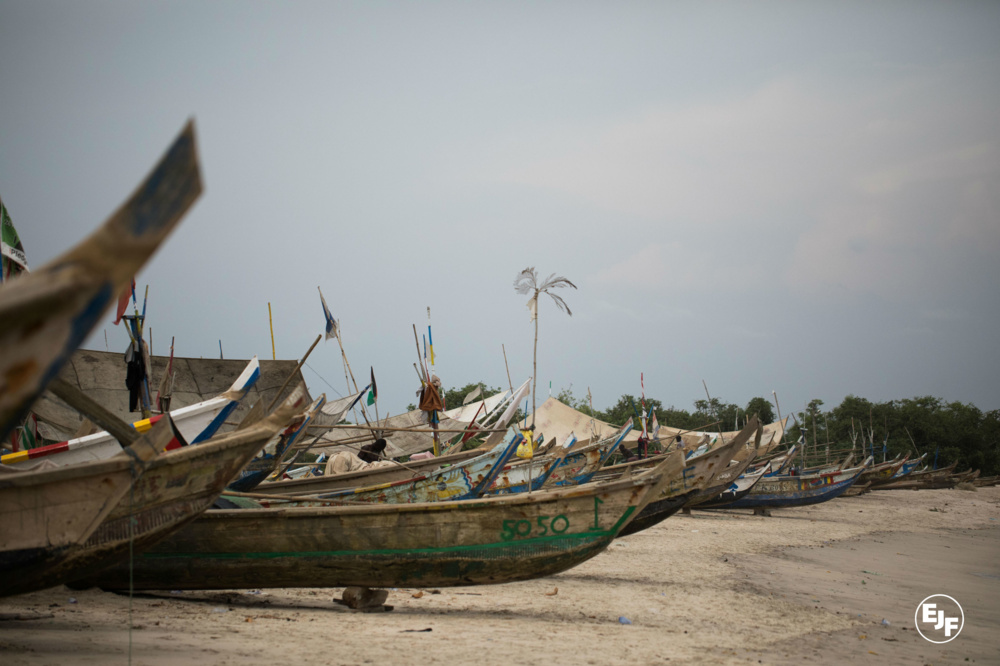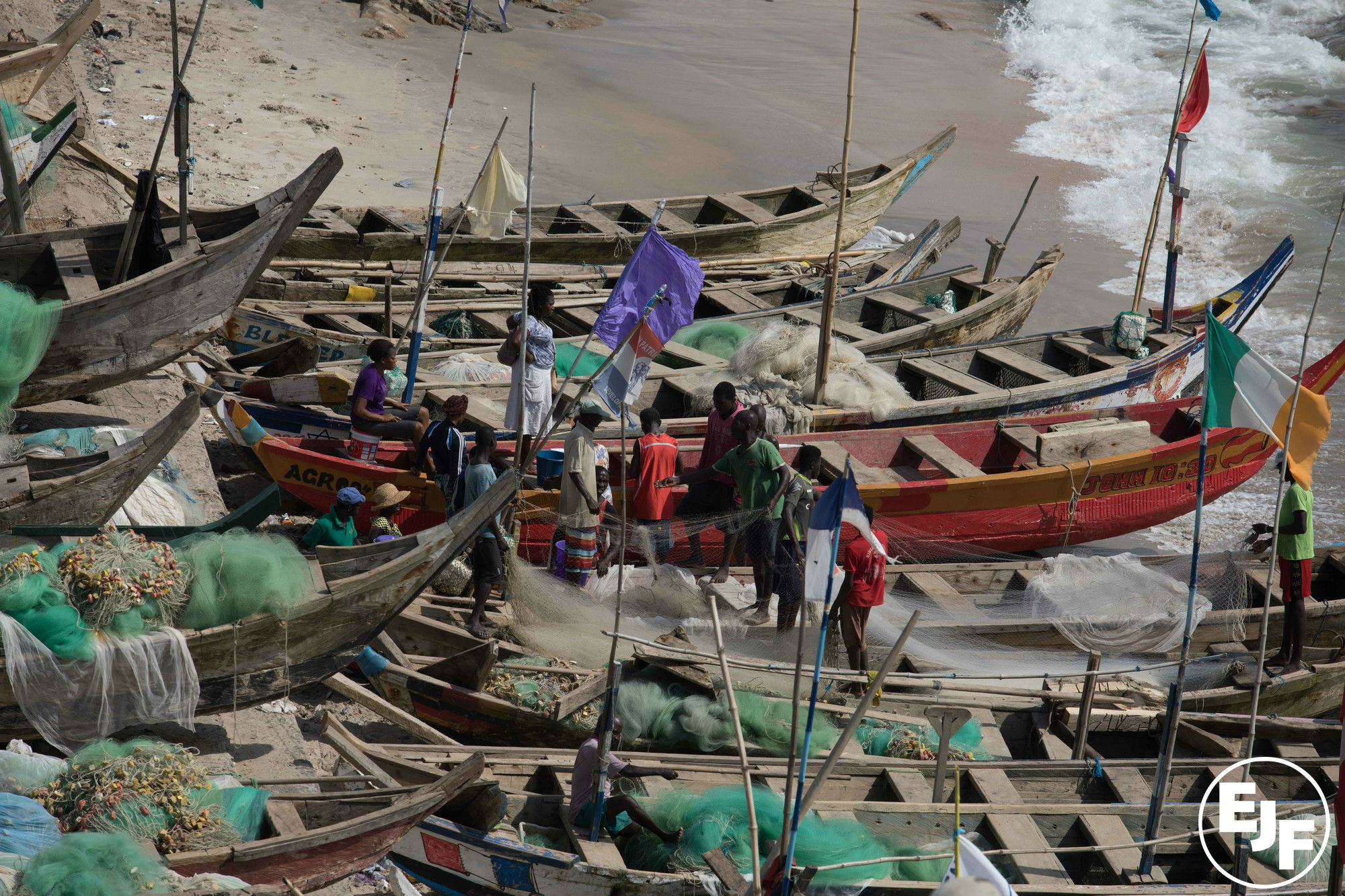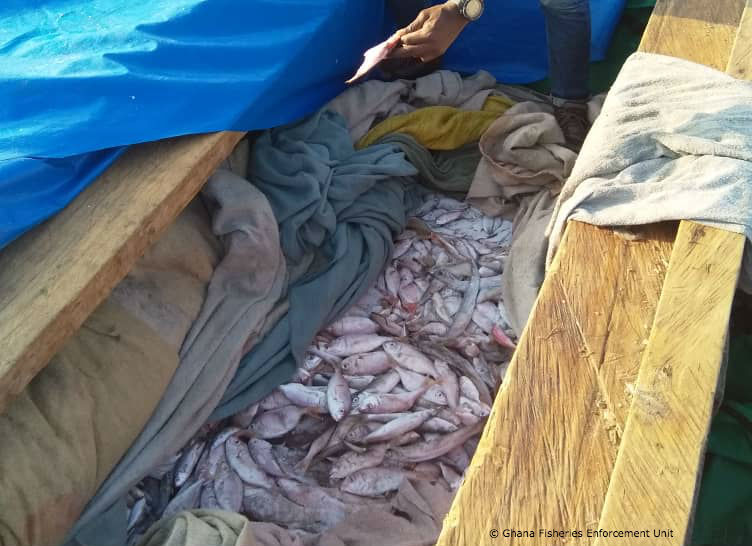
Ghana makes progress towards sustainable fisheries through fair tenure rights
A pioneering meeting in Ghana on 5 April marked a turning point towards implementing the global guidelines on tenure rights, to save the country’s declining fishing industry and safeguard national food security.
The meeting – co-organized by the Environmental Justice Foundation (EJF), Hen Mpoano, and the UN Food and Agriculture Organization (FAO), with the support of the Ministry of Fisheries and Aquaculture Development – brought together traditional authorities, fisher and fish processor associations, representatives from local and national government, spatial planners, civil society organisations, legal experts and academics.
After wide-ranging discussions, it ended with a firm recognition by stakeholders and decision-makers that core principles of the Voluntary Guidelines on the Responsible Governance of Tenure (VGGT) and the Voluntary Guidelines for Securing Sustainable Small-Scale Fisheries (SSF Guidelines) should be implemented to secure the rights of small-scale fishers and safeguard food security.
Rights of access to land, fish stocks and forests are not always guaranteed. Local communities around the world often have effective systems to decide how access is granted to use and control these resources, and the responsibilities that come with such ‘tenure rights’. However, these systems are often informal, and not enshrined in the law.
As times change and conflicts arise, there is the potential that those with the least power will have their rights eroded. In Ghana, this represents a real threat to national food security.
Ghana’s fisheries are in steep decline, with landings of key species for local consumption at their lowest recorded level since 1980. Traditional fishing communities have been hit hardest, with average annual income per canoe dropping by as much as 40% in the last 10 to 15 years.
Small-scale fishers face loss of access to landing sites as a result of coastal development, and encroachment by offshore oil development into traditional fishing grounds. Infringements upon tenure rights also arise from the illegal and destructive practices of industrial fishing vessels.
Chairman of Ghana’s National Canoe Fishermen Council, Nana Jojo Solomon, said:
“Recent years have seen an escalation of conflicts between industrial fishing vessels and local canoes, resulting in collisions and the destruction of fishing gear, in some cases within the inshore zone reserved for canoe fishers. Fishers are rarely able to obtain compensation for their losses, due to difficulties in identifying the offending vessel, and the burden of making a claim.”
Recognition and respect for all forms of legitimate tenure rights in Ghana – whether or not formally recorded – is urgently needed. The VGGT and sister SSF Guidelines together represent a unique step towards this.
The VGGT, unanimously endorsed in 2012 by the UN Committee on World Food Security, help countries safeguard tenure rights, solve conflicts and create laws that provide recognition of informal tenure. Similarly, the SSF Guidelines take a human rights-based approach to securing sustainable small-scale fisheries, with particular attention to vulnerable and marginalised groups.
Executive Director of Environmental Justice Foundation Steve Trent, said:
“EJF and Hen Mpoano are working hard to help build sustainable fisheries in Ghana, and the recognition of tenure rights of local communities is a key part of that. We are delighted to have facilitated the discussion that led to broad-based recognition of the relevance of these international guidelines in addressing the challenges facing Ghana’s fisheries sector.”
Director of Hen Mpoano, Kofi Agbogah, added:
“The guidelines reflect a global consensus on responsible tenure governance and securing sustainable small-scale fisheries, and have been subject to extensive consultations worldwide. Bringing decision-making into line with the guidelines can help to secure the support of those affected by fisheries laws, and ensure that laws are complied with. Crucially the VGGT can provide invaluable guidance as Ghana comes to implement its policy on fisheries co-management, currently in the process of adoption.”
Ghana’s Deputy Minister of Fisheries and Aquaculture Development, Francis Kingsley Ato Cudjoe, welcomed the opportunity to discuss how the guidelines could be applied for the benefit of a more equitable and sustainable fishing industry:
“We hope this meeting will represent a first step towards developing an institutional framework for implementing the guidelines in Ghana, and look forward to working with others in government as we embark on this process.”
The Ghanaian government has already requested that the FAO analyse its existing laws through the lens of the VGGT and SSF Guidelines, to identify areas for improvement and strengths to be built on. The analysis, launched at this week’s roundtable, comes at a crucial moment, as Ghana undertakes a revision of its fisheries law framework that has been in place for the past 15 years.
With these reforms, Ghana has an opportunity to demonstrate leadership in dealing with the complex issues of small-scale fisheries governance and tenure rights, which are being played out, not just in Ghana, but across the world.
Notes for editors
Watch the film from EJF and Hen Mpoano on Ghana’s fisheries: Ghana’s Fishing Sector and the Voluntary Guidelines on Governance of Tenure
Read the briefing from EJF and Hen Mpoano: Principles of good governance for securing equitable and sustainable fisheries
Fisheries
- Small-scale fisheries are a vital source of income and food for millions of people across West Africa, employing 20 times more people than industrial fleets.
- Ghana has one of the largest and most important small-scale fleets in the region, accounting for 11% of total artisanal canoes in West Africa and employing over 80% of fishers in the country.
- Over two million people, or 10% of the country’s total population, depend on fisheries for their livelihoods, with more than 200 coastal villages reliant on fisheries as their primary source of income.
- Illegal, unreported and unregulated fishing is a serious problem in West Africa. In Ghana, along with the encounters described above, trawlers often illegally target small pelagic species such as sardinella, the primary catch of canoe fishers, before transferring the catches to smaller boats at sea to evade oversight of the authorities. Known locally as ‘saiko’, this activity infringes upon tenure rights and severely undermines sustainable fisheries management.
Tenure rights
- A good example of traditional tenure rights is the clam fishery of the Volta estuary. The clam “miners” informally agree to the terms of their tenure: fishing grounds are open six days a week, there is a three-month closed season, and anyone can harvest clams, but they must first seek the approval of the traditional authorities. This system has worked well for decades, but it is completely informal. Now conflicts have started to arise, such as newly built hotels and recreational users of the Volta estuary encroaching on traditional clam landing sites, farming and fishing areas. EJF and Hen Mpoano are facilitating participatory mapping of the clam farming and fishing grounds using the Open Tenure mapping tool developed by FAO.
EJF and Hen Mpoano partnership in Ghana
Since January 2017, EJF and Hen Mpoano have been working in partnership to implement a three-year project dubbed Far Dwuma Nkɔdo (literally meaning securing sustainable fisheries) in the country, with funding from the European Union. As part of this project, EJF and Hen Mpoano are working to help drive a reduction in illegal fishing, and give local fishers a voice in the process to build a more sustainable fishing sector:
- Through a unique combination of local surveillance and remote monitoring, we are strengthening the monitoring and reporting of illegal fishing, and empowering local communities to document illicit fishing activities.
- We are working to empower small-scale fishers, vulnerable and marginalised groups to articulate their interests in fisheries reforms and implement fisheries co-management.
- We are promoting alternative livelihood options for small-scale fishing communities, helping them to diversify their local economies and to reduce their dependence on fishing.
The Environmental Justice Foundation is an international non-governmental organisation working to protect the environment and defend human rights. EJF is a charity registered in England and Wales (1088128). www.ejfoundation.org
Hen Mpoano is a non-profit organisation based in Ghana. Its vision is for inclusive and integrated management of Ghana’s coastal and marine ecosystems to generate long-term socio-economic and ecological benefits.
Contacts:
Daisy Brickhill - EJF Press & Communications Officer
daisy.brickhill@ejfoundation.org
Tel: +44 7871 946 911
Charles Smith – Communications Officer (EJF, Ghana office)
charles.smith@ejfoundation.org
Tel: +233 24 541 2531
Cephas Asare – Programs and Communication Officer, Hen Mpoano
Tel: +233 26 456 6788
SIGN UP FOR OUR EMAILS AND STAY UP TO DATE WITH EJF

